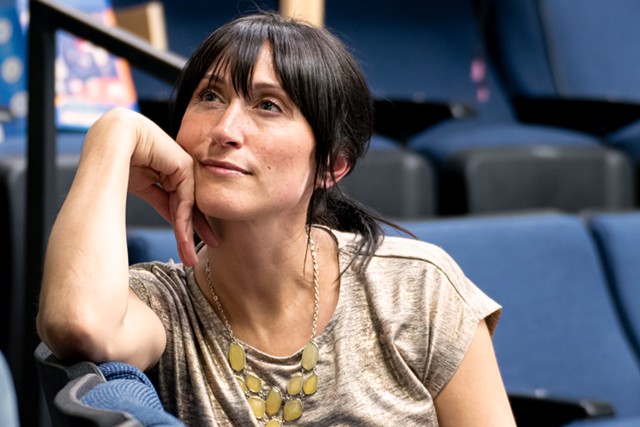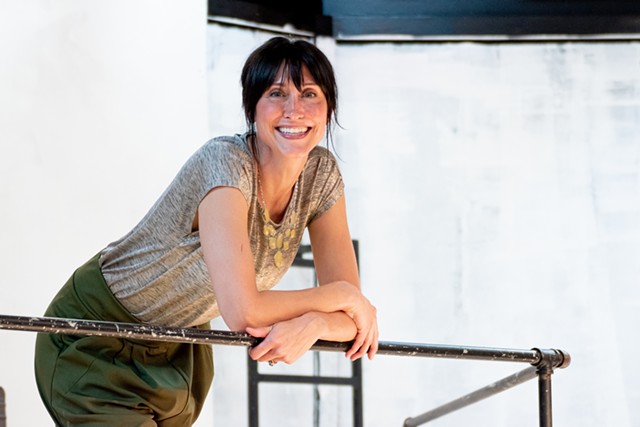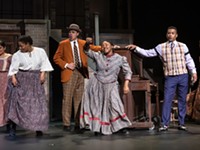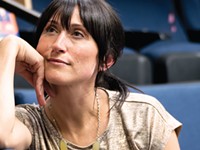Brynn Tyszka, an 'inventive force,' takes the helm at Blackfriars Theatre
By Daniel J. Kushner @danieljkushner[
{
"name": "500x250 Ad",
"insertPoint": "5",
"component": "15667920",
"parentWrapperClass": "",
"requiredCountToDisplay": "1"
}
]
Brynn Tyszka, a theater teacher and a veteran of the Rochester stage, became the artistic director of Blackfriars Theatre in August and the first woman to lead the company in its 73-year-history.
She succeeded Danny Hoskins, who had been the artistic director since 2015. Hoskins, who resigned to take a teaching position at SUNY Brockport, called Tyszka “a very strong, passionate, creative, and inventive force” who commands attention.
“Her work is electric,” Hoskins said. “And that joy and that commitment from her personal artistry is going to bleed over perfectly to her sense of leadership and her sense of direction as she takes the reins of the company.”
The selection of Tyszka means that two of the three major theaters in Rochester — Blackfriars and Geva Theatre Center — now have women at the helm. Elizabeth Williamson was named artistic director at Geva earlier this year and assumed the post in June. The third theater, JCC CenterStage, continues to be overseen by its longtime artistic director Ralph Meranto.
In naming Tyszka to her post, Blackfriars also elevated its director of development, Mary Tiballi Hoffman, to the new title of executive director.
Tyszka acknowledged an excitement about the elevation of women to critical roles in the theater community, but dismissed the distinction of gender as ultimately unimportant.
“I never really loved the word feminism because it implies that we should be looking at ourselves as different,” Tyszka said. “And I don’t. I’ve always said, ‘Well, what do I need to do? What do I need to do to get the job? I’m going to work hard, I’m going to kick butt, I’m going to show ‘em what I got.”
Tyszka, who became Blackfriars’ artistic director on Aug. 1, has deep roots in Rochester’s theater scene.
She has served most recently as Social Media Manager for OFC Creations Theatre Center, in addition to directing, performing, and teaching at the Brighton-based company. An alumnus of Nazareth College’s Theatre Arts program, Tyszka also created, developed, and taught several classes during her tenure as acting department chair at the Rochester Association for the Performing Arts (RAPA) and later had a stint as the director of education at Actors Theatre of Indiana before returning to the Rochester area.
An experienced stage director who has led productions such as the smash musical “Chicago” and the irreverent review “Forbidden Broadway,” Tyszka considers teaching theater to be an important starting point for directing.
“The part of directing that I love is kind of doing that really nerdy script analysis on my own, and then bringing it back to the cast and saying, ‘Oh, but have we thought about this? Have we thought about this?’” she said. “And so that's kind of what I'm really excited about in taking this over, is that I'll get to do that guaranteed at least twice a year.”
Tyszka will be familiar to Blackfriar audiences. She performed in the musicals “Tick, Tick…Boom!” and “Heathers,” as well as the play “Boeing Boeing” in recent years. She also choreographed Blackfriars’ 2015 rendition of “Beehive, The ’60s Musical,” which was coincidentally Hoskins’s first production as artistic director.
Under Hoskins, Blackfriars shed its image of a theater that played to older patrons with tried-and-true productions with proven commercial success and emerged as an incubator for up-and-coming artists and new shows. The result was, in part, new audiences.
With the assistance of Tiballi, who oversaw the creation of new revenue streams, the theater increased its annual operating budget to $440,000 from $150,000 in the years leading up to the onset of the pandemic.
For instance, while he didn’t shy from recognizable hits, he focused on staging new works and more obscure Broadway and off-Broadway show that were intimate in scope but didn’t have the same marquee recognition as the likes of “Rent,” The Grapes of Wrath,” and “It’s a Wonderful Life,” which had been staples of the company. He also had a soft spot for character-driven stories, from the lighthearted musical “Hands on a Hardbody” to dramatic plays such as “Annapurna,” “Detroit ’67,” and “Surely Goodness and Mercy.”
Perhaps his most enduring contribution was the creation of the Blackfriars Theatre Summer Intensive (affectionately referred to as Bitsy), a theater program for students ranging from high school juniors to college seniors interested in pursuing a professional acting career.
“It was really important to me that we have an education component at Blackfriars,” Hoskins said. “There hadn't been one before. And not only an education program, but an education program that trained the next generation of artists, that put them in this environment and asked them to raise the expectations of what they do to the same level that we expect of our professional artists.”
Tyszka said she would look to expand on Blackfriars’ reputation for openness and inclusivity.
“We want a collaborative effort here, as Danny has probably already mentioned, and one where people feel like their voices are heard and where they feel like they’re in a safe space,” Tyszka said.
Providing opportunities to a diverse group of actors is important to Tyszka, who said that body-shaming, an ableist mentality or other discriminatory attitudes are not a consideration to her when casting. Instead, the priority is given to what the script actually demands of the character.
“Does this person have to be a fantastic dancer because the script says so?” Tyszka said. “No. So can this person have rheumatoid arthritis? Can this person be in a wheelchair? Okay, fine, yeah. Does the script demand that they can't be? Then let's not worry about that. Or does this person have to be a size two? No, the script doesn't demand that. All the script demands is that the person is sexy or desirable. That can look like a lot of different things.”
Tyszka said that in her first couple years at Blackfriars, at least three to four productions per season will be recognizable to audiences, such as musical adaptations of popular movies or plays people read as students.
“The world is tense right now, and our country is tense right now,” she said. “And I think that one thing we can do to help relieve that is to give people a place where they can shut their minds off for a little bit, where they can let themselves relax enough to laugh, and where they feel catharsis at the end. This is not a time when I would be doing a script that leaves things open-ended, and makes you leave feeling tense. This would be a time I think to focus on things that feel cathartic, and either reviving or relieving.”
The switch in roles for Tyszka and Hoskins has both theater professionals taking the next logical step in their respective careers, and at ideal landing spots.
Hoskins leaves Blackfriars in August to work full-time at SUNY Brockport as an assistant theater professor. He said the career change will allow him to spend more time at home with his two daughters, and cultivate a seed sown long ago.
“It's always been in the back of my mind that moving into higher education would be where I would love to end up,” Hoskins said. “My mentors have all been teachers, and it was something that in my undergrad, also in grad school, I felt really strongly about and was instilled with me with my professors. That they had all worked professionally in the field, and they had come back to higher education to give back to the students to train that next generation passionately, and with joy and with love, and with a strong sense of integrity in the work.”
Tyszka said she wasn’t expecting the position of artistic director to come available, but that it’s not a stretch to call it her dream job.
“This would have absolutely been end-game for me, 100 percent. I will retire, and they’re going to have to kick me out,” Tyszka said with a laugh. “In a wheelchair, they’re going to have to kick me out.”
Daniel J. Kushner is CITY's arts editor. He can be reached at [email protected].
She succeeded Danny Hoskins, who had been the artistic director since 2015. Hoskins, who resigned to take a teaching position at SUNY Brockport, called Tyszka “a very strong, passionate, creative, and inventive force” who commands attention.
“Her work is electric,” Hoskins said. “And that joy and that commitment from her personal artistry is going to bleed over perfectly to her sense of leadership and her sense of direction as she takes the reins of the company.”
The selection of Tyszka means that two of the three major theaters in Rochester — Blackfriars and Geva Theatre Center — now have women at the helm. Elizabeth Williamson was named artistic director at Geva earlier this year and assumed the post in June. The third theater, JCC CenterStage, continues to be overseen by its longtime artistic director Ralph Meranto.
In naming Tyszka to her post, Blackfriars also elevated its director of development, Mary Tiballi Hoffman, to the new title of executive director.
Tyszka acknowledged an excitement about the elevation of women to critical roles in the theater community, but dismissed the distinction of gender as ultimately unimportant.
“I never really loved the word feminism because it implies that we should be looking at ourselves as different,” Tyszka said. “And I don’t. I’ve always said, ‘Well, what do I need to do? What do I need to do to get the job? I’m going to work hard, I’m going to kick butt, I’m going to show ‘em what I got.”
Tyszka, who became Blackfriars’ artistic director on Aug. 1, has deep roots in Rochester’s theater scene.
She has served most recently as Social Media Manager for OFC Creations Theatre Center, in addition to directing, performing, and teaching at the Brighton-based company. An alumnus of Nazareth College’s Theatre Arts program, Tyszka also created, developed, and taught several classes during her tenure as acting department chair at the Rochester Association for the Performing Arts (RAPA) and later had a stint as the director of education at Actors Theatre of Indiana before returning to the Rochester area.
An experienced stage director who has led productions such as the smash musical “Chicago” and the irreverent review “Forbidden Broadway,” Tyszka considers teaching theater to be an important starting point for directing.
“The part of directing that I love is kind of doing that really nerdy script analysis on my own, and then bringing it back to the cast and saying, ‘Oh, but have we thought about this? Have we thought about this?’” she said. “And so that's kind of what I'm really excited about in taking this over, is that I'll get to do that guaranteed at least twice a year.”
Tyszka will be familiar to Blackfriar audiences. She performed in the musicals “Tick, Tick…Boom!” and “Heathers,” as well as the play “Boeing Boeing” in recent years. She also choreographed Blackfriars’ 2015 rendition of “Beehive, The ’60s Musical,” which was coincidentally Hoskins’s first production as artistic director.
Under Hoskins, Blackfriars shed its image of a theater that played to older patrons with tried-and-true productions with proven commercial success and emerged as an incubator for up-and-coming artists and new shows. The result was, in part, new audiences.
With the assistance of Tiballi, who oversaw the creation of new revenue streams, the theater increased its annual operating budget to $440,000 from $150,000 in the years leading up to the onset of the pandemic.
For instance, while he didn’t shy from recognizable hits, he focused on staging new works and more obscure Broadway and off-Broadway show that were intimate in scope but didn’t have the same marquee recognition as the likes of “Rent,” The Grapes of Wrath,” and “It’s a Wonderful Life,” which had been staples of the company. He also had a soft spot for character-driven stories, from the lighthearted musical “Hands on a Hardbody” to dramatic plays such as “Annapurna,” “Detroit ’67,” and “Surely Goodness and Mercy.”
Perhaps his most enduring contribution was the creation of the Blackfriars Theatre Summer Intensive (affectionately referred to as Bitsy), a theater program for students ranging from high school juniors to college seniors interested in pursuing a professional acting career.
“It was really important to me that we have an education component at Blackfriars,” Hoskins said. “There hadn't been one before. And not only an education program, but an education program that trained the next generation of artists, that put them in this environment and asked them to raise the expectations of what they do to the same level that we expect of our professional artists.”
Tyszka said she would look to expand on Blackfriars’ reputation for openness and inclusivity.
“We want a collaborative effort here, as Danny has probably already mentioned, and one where people feel like their voices are heard and where they feel like they’re in a safe space,” Tyszka said.
Providing opportunities to a diverse group of actors is important to Tyszka, who said that body-shaming, an ableist mentality or other discriminatory attitudes are not a consideration to her when casting. Instead, the priority is given to what the script actually demands of the character.
“Does this person have to be a fantastic dancer because the script says so?” Tyszka said. “No. So can this person have rheumatoid arthritis? Can this person be in a wheelchair? Okay, fine, yeah. Does the script demand that they can't be? Then let's not worry about that. Or does this person have to be a size two? No, the script doesn't demand that. All the script demands is that the person is sexy or desirable. That can look like a lot of different things.”
Tyszka said that in her first couple years at Blackfriars, at least three to four productions per season will be recognizable to audiences, such as musical adaptations of popular movies or plays people read as students.
“The world is tense right now, and our country is tense right now,” she said. “And I think that one thing we can do to help relieve that is to give people a place where they can shut their minds off for a little bit, where they can let themselves relax enough to laugh, and where they feel catharsis at the end. This is not a time when I would be doing a script that leaves things open-ended, and makes you leave feeling tense. This would be a time I think to focus on things that feel cathartic, and either reviving or relieving.”
The switch in roles for Tyszka and Hoskins has both theater professionals taking the next logical step in their respective careers, and at ideal landing spots.
Hoskins leaves Blackfriars in August to work full-time at SUNY Brockport as an assistant theater professor. He said the career change will allow him to spend more time at home with his two daughters, and cultivate a seed sown long ago.
“It's always been in the back of my mind that moving into higher education would be where I would love to end up,” Hoskins said. “My mentors have all been teachers, and it was something that in my undergrad, also in grad school, I felt really strongly about and was instilled with me with my professors. That they had all worked professionally in the field, and they had come back to higher education to give back to the students to train that next generation passionately, and with joy and with love, and with a strong sense of integrity in the work.”
Tyszka said she wasn’t expecting the position of artistic director to come available, but that it’s not a stretch to call it her dream job.
“This would have absolutely been end-game for me, 100 percent. I will retire, and they’re going to have to kick me out,” Tyszka said with a laugh. “In a wheelchair, they’re going to have to kick me out.”
Daniel J. Kushner is CITY's arts editor. He can be reached at [email protected].
Speaking of...
Latest in Public Lives
More by Daniel J. Kushner
-

Concert Review | The Head and the Heart
Jul 25, 2024 -

Where the bluegrass is always greener
Jul 19, 2024 -

Illustrated escapism
Jul 15, 2024 - More »









